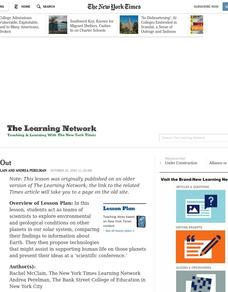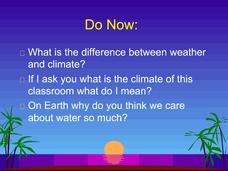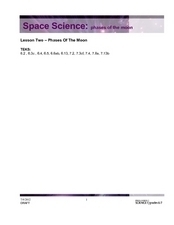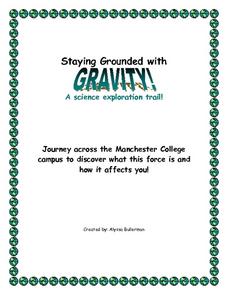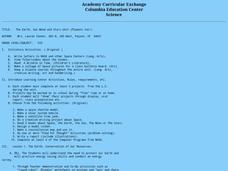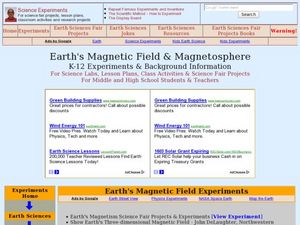Curated OER
Spacing Out
Students explore environmental and geological conditions on other planets in our solar system, comparing their findings to information about Earth. They propose technologies that might assist in supporting human life on those planets.
Curated OER
Plants In Space
In this biology activity, students grow corn plants in growth pouches as the control group in an experiment on plant growth in microgravity. Then they analyze any differences that occur between Earth-grown and space-grown corn plants.
Curated OER
Space Internet Hunt
In this space worksheet, students click on the links in the questions about space to find the answers to the questions and then come back and answer the questions. Students answer 17 questions total.
Curated OER
The Movement of Ocean Water-Science Puzzlers, Twisters & Teasers
In this earth science worksheet, students complete 19 questions about oceans and the movement of ocean water in the form of puzzles, word scrambles, and brain teasers.
Space Awareness
History of the Universe
Your pupils may believe that you and their parents are the oldest things in the universe, but surprise! There are elements of the universe that are even older. Elementary scientists create a class timeline to demonstrate the expansive...
NASA
Space-Based Astronomy on the Internet
Young scientists compile everything they have learned into a report in the fifth and final lesson in a unit on the visible light spectrum. Access to photos from observatories, telescopes, and satellites allows learners to compare and...
K5 Learning
Space Based Astronomy
How much astronomy can you study with the naked eye? Learn more about the ways scientists explore the galaxy with a short reading passage and set of short-answer questions.
Port Jefferson School District
Water and Climate
Dive into a lesson on the hydrosphere with this Powerpoint presentation. Building on prior knowledge of the water cycle, young scientists learn what happens to water after it falls as precipitation and explore the different factors...
Mrs. Sol's Class
Solar System Project
Finish or launch your unit on the solar system with a jigsaw project covering major celestial concepts such as the Milky Way Galaxy, asteroids, meteors, comets, Earth's moon, and, of course, all the planets. Learners start by writing...
School Science
The Big Bang Time Machine
Scholars take off on an interactive spaceship to explore a historical timeline of the big bang theory. They learn about the evolution of mammals and humans, the formation of stars and planets, and the chemical composition of the early...
NOAA
Satellite Communications
How do satellites communicate? What types of satellites orbit Earth? Discover and mimic the way satellites communicate between two points in a hands-on activity that has pupils using mirrors, flashlights, and marbles.
PBS
Experience a Solar Eclipse
Didn't catch the last solar eclipse? Now every day can be eclipse day, thanks to an interactive lesson plan from PBS' Space series for middle schoolers! The well-rounded multi-media experience includes video clips, an interactive, and...
PBS
Why Isn't There an Eclipse Every Month?
Searching for an eclipse activity that sends scholars over the moon? Try an interesting interactive to get their minds active! The resource, part of an extensive Space series from PBS Learning Media, uses modeling and data analysis to...
Glynn County School System
Light, History, Gravity, Distance, Relativity, and Space-Time
Let the star's color be the guide! The color of a star indicates its temperature and its mass and distance affect the gravitational force. The lesson presentations address these concepts as well as how the theory of special relativity...
PHET
Measuring the Interplanetary Magnetic Field
Scientists need to figure out how to measure interplanetary magnetic fields, but the magnetic field of the spacecraft is interfering with their readings. Scholars attempt to solve the problem that has perplexed NASA scientists for years.
Curated OER
Space Science: Phases of the Moon
Looking for a terrific lesson on the phases of the moon that has lots of good worksheets? With two excellent websites are embedded in the plan, the activity is sure to spark some interest in your astronomy unit. Some common...
Curated OER
Staying Grounded with Gravity: A Science Exploration Trail
What a great idea for scientific inquiry. This lab was intended for use as children explored a college campus, but it could be used anywhere. They go to three different places on campus and conduct a simple experiment that shows an...
Curated OER
Science Trail
Students explore the solar system by conducting Earth science experiments. In this Sun lesson, students identify the different seasons on Earth and discuss their purpose and cause. Students create a sundial and observe the changes to...
Curated OER
Our Space Station Earth
Middle schoolers discover ways to preserve the Earth's resources. In this natural resources lesson, students investigate how many gallons of water the average American uses per day and then total their estimated usage. Middle schoolers...
Curated OER
Earth System Science
Learners investigate the age of the earth by using accepted scientific methods. They conduct research about the use of radioactive dating and there is a simulation activity of the process. Finally, students measure the radioactive decay...
Curated OER
The Earth, Sun, Moon, And Stars
Fifth graders explore the solar system. In this solar system unit, 5th graders investigate numerous projects while rotating through learning centers. Students write about space and construct a space shuttle model. Students practice map...
Curated OER
Layers of the Earth
Eighth graders study the earth's surface. In this planet structure lesson students view a PowerPoint presentation then draw and label the earths layers.
Curated OER
Earth's Magnetic Field and Magnetosphere
Students investigate the magnitude of Earth's magnetic field using PASCO. In this physics lesson, students describe the features of the magnetosphere. They explain how atmosphere layers protect the Earth.
Curated OER
Space Science
Eighth graders study the objects in our solar system. In this space lesson students identify and describe planets, then classify them as terrestrial or gaseous.
Other popular searches
- Space Science on Earth
- +Earth and Space Science
- Earth Space Science Quiz
- Inquiry Earth Space Science
- Earth and Space Sciences
- Science Earth and Space
- Earth Space Sciences
- Earth/space Science


